
by Legalnaija | Jul 20, 2025 | Uncategorized
Franchise law is a relatively niche area of law in Nigeria. It is not as common as other areas of law in Nigeria. Franchising is a commercial aspect of law. Many law students would be familiar with the word ‘franchise’ from commercial law and contract law. Nigeria does not have a specific Franchise legislation like such countries as Brazil [Brazilian Franchise Law (Law No. 8955 of December 15, 1994)], Australia [Trade Practices (Industry Codes-Franchising)] or China [Measures for the Administration of Commercial Franchise)(2005)].[1] In this article, we shall discuss franchise law and franchise related laws in Nigeria.
What is a franchise? According to the International Franchise Association, a franchise is “the agreement or license between two legally independent parties which gives a person or a group of people (franchisee) the right to market a product or service using the trademark or trade name of another business (franchisor)”.[2] In layman terms, a franchise is a contract between two parties where one party (franchisee) agrees to market a product of another party (franchisor) in return for financial remuneration.
Franchise law on the other hand, is the law regulating the offer or sale of Franchises, business opportunities, seller-assisted marketing plans or similar relationships, or governing the relationships between franchisors and franchisees, manufactures and dealers, or grantors and distributors, including those laws that address unfair practices related to, or the non-renewal or transfer of, franchises, dealerships and distributorships.[3]What this means is that franchise law is a law that governs the relationships between a party who agrees to market/distribute a product (franchisee) on the behalf of the other (franchisor).
As was previously stated, Nigeria does not have a specific law in regards to franchising. However, just because there is no franchise specific law does not mean that franchising as a whole is not regulated in Nigeria. There are numerous laws in Nigeria that influence franchising in the country. Franchising is comprised of the following list of laws: Company Law, Intellectual Property Law, Tax Law, Labor Law, and Employment Law.[4]In scenarios where the franchisor is a foreign entity, other areas of law apply such as Immigration Law, Foreign Investment Law, Foreign Exchange Law and Money Laundering Law.
We shall now analyze the following statutes that have impacted franchising in Nigeria:
- The Trademark Act 1965 (Cap 436, Laws of the Federation of Nigeria 199). This deals with Trademarks, which is an aspect of Intellectual Property Law. As previously stated, intellectual property law is an element of franchising.
- The Patents & Design Act 1970 (Cap 344, Laws of the Federation of Nigeria 1990); This Act makes provisions for the proprietorship of Patents and Designs in Nigeria.[5] The 1970 Act is not franchise specific but has elements of franchising as a result of patents and designs.
- The Copyright Act 1988 (Cap 68, Laws of the Federation of Nigeria 1990); This piece of legislation is concerned with the ownership of copyrights in Nigeria. It is not a franchise-specific legislation but copyright is under intellectual property law which is an element of franchising. Section 3 of the Act talks about copyright by reference to country of origin. What this means is that any copyright that is published or made in Nigeria shall make reference to the country of origin of the copyright itself. Section 4A grants a company established under the laws of a country that is a party to an obligation to a treaty or other international agreement to which Nigeria is a party the right to own its copyright in Nigeria.[6]
- National Office of Technology Acquisition and Promotion (NOTAP) Act No. 70 of 1979 (Cap 268 Laws of the Federation of Nigeria 1990). This Act regulates the transfer of foreign technology to Nigeria. A franchise arrangement is regarded as involving the transfer of technology and as such is regulated by the provisions of the NOTAP Act. It should be noted that NOTAP is not the regulatory act for franchising in Nigeria. Section 4(d) and (e) of the NOTAP Act grants NOTAP the power to register franchise agreements involving franchisors. The section goes further to state that the agreement shall be registered if in the opinion of NOTAP, it involves the use of trademarks, the right to use patented inventions, the supply of technical expertise in the form of the preparation of plans, diagrams, operating manuals or any other form of technical assistance of any description whatsoever, the provision of operating staff or managerial assistance and the training of personnel etc.
- The Nigerian Investment Promotion Commission Act (Decree No. 16 of 1995). The NIPC Act is responsible for registering foreign investments in Nigeria, as well as liaising between investors and government.
- The Immigration Act 2015 (Cap. 171 Laws of the Federation of Nigeria 1990). This statute regulates the movements of persons entering or leaving Nigeria. This statute provides that any company with non-nationals must obtain a business permit in order to carry on business in Nigeria. Section 36(1) (b) of the Act states that any immigrant who wishes to conduct any business in Nigeria must obtain the consent of the Nigerian Minister of Interior in writing.[7]
- The Immigration Regulations 2017; Like the Immigration Act 2015, this act stipulates that any company with non-nationals must obtain a business permit in order to conduct any business in Nigeria. Section 4(1) of the Act asserts that for a foreign company to establish a business in Nigeria, it must first of all obtain a business permit from the Minister of Interior otherwise known as the “Minister”.[8] This is not franchise specific but it could be said that for a franchisor to set up a franchise in Nigeria it would need to obtain a business permit from the Minister of Interior.
- The Companies and Allied Matters Act 2020. This act deals with the registration and exemptions of foreign companies in Nigeria. Any foreign entity that intends to set up a business in Nigeria must incorporate a local company for that purpose. Section 78 of the Act asserts that any foreign company that intends to carry out business in Nigeria shall take all necessary steps to incorporate the company as a separate entity in Nigeria and until such act is achieved, cannot conduct business in Nigeria.[9]
Agencies that Regulate Franchising in Nigeria
In many jurisdictions, thee are special agencies that regulate franchising and implement franchise-specific laws and regulations. However, in Nigeria, there is no specific-designated franchise agency. What you have are agencies that regulate elements of franchising such as:
- The Registrar of Trademarks, Patents and Industrial Design, Federal Ministry of Commerce;
- The Nigerian Copyright Commission which is under the Ministry of Culture;
- The National Office for Technology Acquisition and Promotion;
- Nigerian Investment Promotion Commission and
- The Corporate Affairs Commission.
Conclusion
Nigeria does not have a franchise-specific legislation. However, as previously mention, many laws in Nigeria affect franchising agreements directly and indirectly. Does Nigeria need a franchise-specific legislation? Sure it does. As Nigeria seeks to attract foreign investment into its jurisdiction, there will be a need to regulate the activities of foreign companies in the country in order to protect local businesses (franchisees).
BIBLIOGRAPHY
LIST OF STATUTES
- Copyright Act (Cap. 68, Laws of the Federation of Nigeria, 1990 as amended by the Copyright Amendment Decree No. 98 of 1992 and the Copyright (Amendment) Decree 1999).
- Companies and Allied Matters Act, 2020.
- Immigration Act, 2015.
- Immigration Regulation, 2017.
- Nigerian Investment Promotions and Commissions Act,
LIST OF WEBSITES
Babatunde Denton is an associate of The City Law Associates. He was called to the Nigerian Bar in 2016 and specializes in immigration law, commercial law and intellectual property law. His contact address is Suite 3, 18 King George V Street, Onikan, Lagos. Email address is denton@citylaw.ng.
[1] http://www.nigerianfranchise.org/images/NiFA_Newsletter_03_05_14.pdf
[2] https://archive.businessday.ng/professional-services/article/franchising-law-in-nigeria/#:~:text=Nigeria%20does%20not%20have%20a%20franchise-specific%20legislation.%20In,Disclosure%20Act%20of%202006%29%20that%20have%20franchise-specific%20laws.
[3] https://www.lawinsider.com/dictionary/franchise-law
[4] https://archive.businessday.ng/professional-services/article/franchising-law-in-nigeria/#:~:text=Nigeria%20does%20not%20have%20a%20franchise-specific%20legislation.%20In,Disclosure%20Act%20of%202006%29%20that%20have%20franchise-specific%20laws.
[5] http://www.commonlii.org/ng/legis/num_act/pada195/
[6] Copyright Act (Cap. 68, Laws of the Federation of Nigeria, 1990 as amended by the Copyright Amendment Decree No. 98 of 1992 and the Copyright (Amendment) Decree 1999).
[7] Section 36 (1)(b) of The Immigration Act 2015, Laws of the Federation of Nigeria.
[8] Section 4 (1) of The Immigration Regulations, 2017
[9] Section 78 (1) of the Companies And Allied Matters Act, 2020.
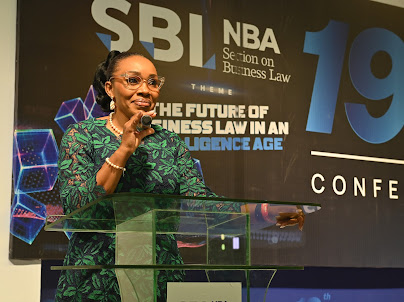
by Legalnaija | Jul 3, 2025 | Blawg, Uncategorized
Good afternoon, distinguished guests, colleagues, friends, and partners.
I am pleased to welcome you all to the 19th Annual International Business Law Conference of the Nigerian Bar Association, Section on Business Law.
We are gathered here today not just for another conference but for what has become a defining tradition: an annual meeting of minds across industries, disciplines, borders, and generations. And it is fitting that we return to this space, Lagos, Nigeria’s commercial heart, to reflect, learn, and chart a way forward in our legal profession.
The theme of this year’s conference, “The Future of Business Law in an Intelligent Age,”could not be more timely. We are witnessing a global redefinition of how business is conducted, how information is processed, and how value is created. Artificial intelligence, data ecosystems, and predictive technologies are no longer ideas on the horizon; they arehere and now – today’s realities that we must engage with directly, as lawyers, as business leaders, as policymakers, and as players in every economic space.
This moment demands that we, as a legal community, become not just participants but shapers of the future. We cannot afford to remain observers on the sidelines of technological change. We must be architects of legal frameworks that are responsive, adaptive, and bold enough to embrace the unknown without sacrificing our principles. This means strengthening our engagement with regulators, legislators, and institutions, ensuring that the law evolves alongside innovation, not behind it.
Through plenaries, breakout sessions, fireside chats, master classes, and informal conversations, we will interrogate the intersection of law, innovation, regulation, investment, and impact. This year, we are especially honoured to have His Highness, Khalifa Muhammad Sanusi II, deliver our keynote address; his experience as a reformer and thought leader will set a powerful tone for the work ahead. Over the next 3 (three) days, we will explore how emerging technologies are transforming industries, from manufacturing and aviation to fintech, healthcare, entertainment, and education, and ask ourselves what role we must play to ensure that business law remains not only relevant but indispensable in shaping the future. This year’s programme has been carefully curated to ensure that we are leading the ongoing discussions around shaping contextually relevant, commercially sound, and socially conscious responses.
This conference is not just about the future of business law; it is about the future of business. As Africa positions itself as a hub for innovation, trade, and investment, the Nigerian legal community has a critical role to play in shaping policies, fostering trust, and driving the integrity of markets across the continent. What we discuss here will echo far beyond this hall, and the ripple effects of our ideas and actions will be felt in boardrooms, courtrooms, startups, government houses, and classrooms.
What makes this gathering truly powerful is not just the programme, it is the people. This
year, we welcome over a thousand delegates, seasoned professionals, young lawyers, regulators, senior advocates and leaders of this profession, public servants, entrepreneurs, creatives, and investors. Each of you brings your experience, perspectives, and energy. I encourage everyone connect, collaborate, contribute. To the lawyers, I say this – whether you advise multinationals, lead internal legal teams, or represent SMEs navigating change,
there is something for everyone here: insight, tools, and connections that can strengthen how you show up in your role and for your clients.
I would like to thank the President of the Nigerian Bar Association, Mazi Afam Osigwe, SAN, for his leadership of our bar, and his support for this Section. I would also like to thank the executives of the NBA who at various times alongside our President have provided support and guidance to me in my role as the chairman of this section. Let me take a moment to acknowledge and thank the phenomenal team that made this conference possible, the 2025
Conference Planning Committee under the committed leadership of Ms. Solape Peters (Chair) and Mr. Oludare Senbore (Vice chair). I also thank our sponsors and partners, whose support reflects their belief in the importance of this platform. To all our resource persons who have so graciously committed their time and expertise – you have our
gratitude. And the SBL Executive Committee and Secretariat, whose tireless behind-thescenes work has brought this vision to life – thank you. Over the past year, we have deepened our investment in capacity-building, expanded our digital footprint, and created new spaces for dialogue across sectors. The SBL continues to evolve, and I am proud of the energy, inclusiveness, and direction this leadership team has championed.
As we open this 19th edition of the NBA-SBL Conference, let us remind ourselves that we are here not just to witness change, but to influence it. Not just to talk, but to act. Not just to listen, but to lead.
I hope that by the time we leave this venue in a few days, we will do so with more than just conference bags and notebooks; we will go with new ideas, new relationships, new perspectives, and a renewed commitment to making business law work for this intelligent, ever-evolving age. On behalf of the NBA-SBL Executive Committee and the Conference Planning Committee, I welcome you all.
Thank you.
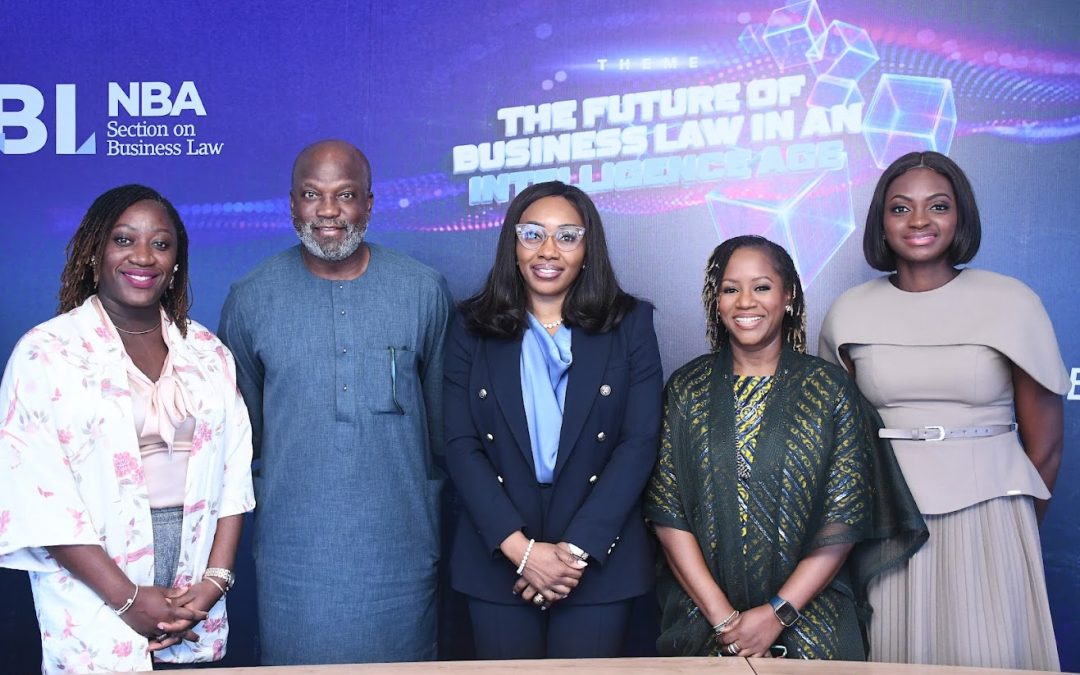
by Legalnaija | Jun 23, 2025 | Uncategorized
The Nigerian Bar Association – Section on Business Law (NBA-SBL) held its press conference ahead of the 19th Annual International Business Law Conference, a premier gathering of legal professionals, members of the press and business leaders. The program commenced at 11:00 AM, with Miss Rachel Olayemi serving as the anchor. After introducing herself, Miss Olayemi provided an overview of the day’s program. This was followed by the welcome address delivered by the Chairman of the NBA-SBL, who provided insight into the core objectives and significance of this year’s conference.
In her address, the Chairman emphasized that the conference was not simply a response to changing times, but a deliberate effort to lead the transformation of business law both in Nigeria and globally. She noted that in this era of digital information and artificial intelligence, the legal industry must actively engage in shaping the future. This year’s program was thoughtfully curated to reflect the “era of intelligence” in business across vital sectors of the economy.
She went on to explain that the conference would feature five plenary sessions and six breakout sessions, in addition to networking events, and would conclude with a closing party. She stated that the conference would host members of the press, policymakers, legal professionals, and industry stakeholders, underscoring its national and international importance.
Following the welcome address, Mrs. Solape Peters, a partner at DLA Piper and the Chairperson of the 19th Conference Planning Committee, shared her reflections on the purpose and expected outcomes of the event. She pointed out that technology now lies at the heart of every industry, and the business law sector must not lag behind. She highlighted the collaborative role of the Business Law Section with the National Assembly in drafting legislation that will foster a favorable environment for business operations in Nigeria.
Mrs. Peters also remarked that the Section on Business Law is renowned for organizing conferences that shape legal and regulatory discourse and directly influence how governance affects business. This year’s conference, she said, is designed to spark a mindset shift among those unfamiliar with emerging developments and to offer fresh perspectives to those already on the path of legal innovation. She also announced that two specialized masterclasses would be introduced this year.
Mrs. Peters further acknowledged the immense support of sponsors, stating that their continued partnership has been instrumental in ensuring the successful hosting of the conference year after year. She noted that the planning committee had engaged stakeholders from the regulatory, public, and private sectors, with the expectation that the discussions and outcomes of the event would help drive legal and policy reforms.
Also speaking at the opening session was Mrs. Yeside Asolo, a partner at Kayode Sofola & Associates and the Content and Program Chairperson. She provided a detailed breakdown of the conference schedule. According to her, the event would commence with a lunch on July 2nd, while the main sessions would begin on July 3rd, featuring four plenary sessions covering international trade, healthcare, and technology. The third day, would focus on sectors such as manufacturing, power, oil and gas, and aviation. The conference would conclude with a closing party, offering attendees the opportunity to unwind and network in a relaxed atmosphere.
Finally, the Chairperson of the Media Strategy Committee also addressed the audience, highlighting the media plan for the year. She stated that the media strategy is designed to:
- Showcase the value of the conference to all attendees,
- Attract professionals seeking networking and collaboration opportunities, and
- Draw global attention to the significance of the NBA-SBL conference as a leading platform for business law discourse in Africa.
The emphasis was on using strategic media engagement to amplify the impact of the conference beyond the legal community and to demonstrate the NBA-SBL’s commitment to influencing national policy, legal reforms, and business-friendly regulatory frameworks.
In conclusion, the NBA-SBL 19th Annual Business Law Conference promises to be an intellectually stimulating and strategically significant event, with a clear focus on technology, innovation, collaboration, and legal reform. With diverse participation from legal practitioners, policymakers, industry experts, and international stakeholders, the conference is set to shape the future trajectory of business law in Nigeria and beyond. The inclusion of targeted masterclasses, comprehensive plenary sessions, and structured networking opportunities underscores the Section’s commitment to providing value, relevance, and impact to the legal and business communities it serves.
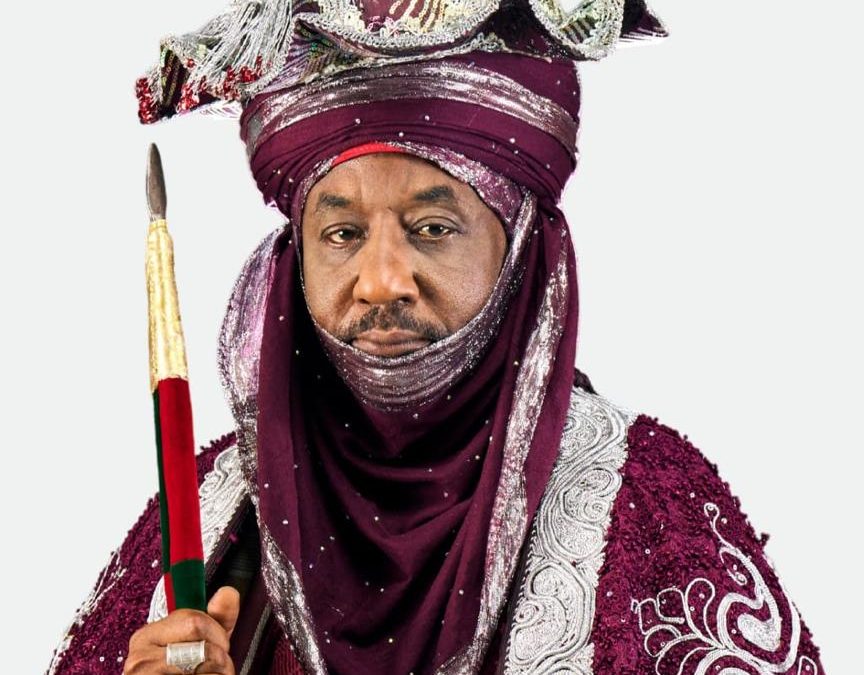
by Legalnaija | Jun 17, 2025 | Uncategorized
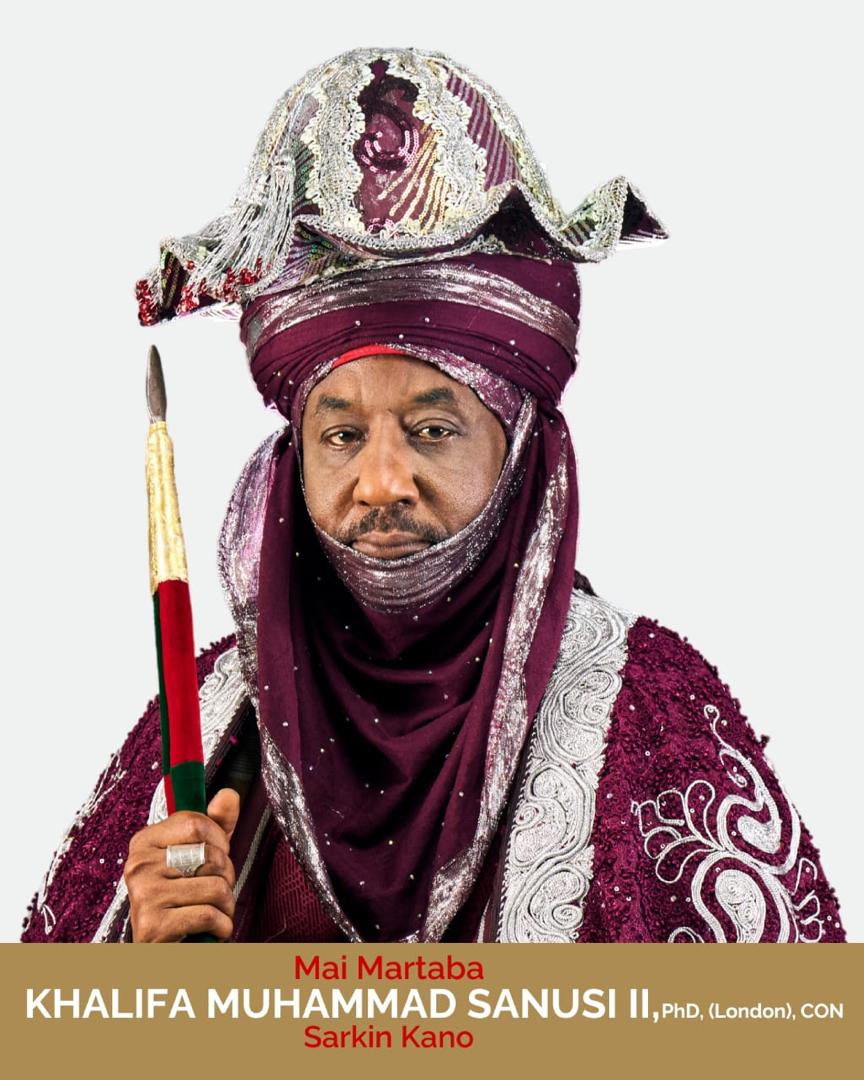
The Nigerian Bar Association Section on Business Law (NBA-SBL) is proud to announce His Royal Highness, Khalifa Muhammadu Sanusi II PhD (London) CON, as the Keynote Speaker for the 19th Annual Business Law Conference, scheduled to take place from July 2nd to 4th, 2025, at Harbour Point, Victoria Island, Lagos.
His Royal Highness. Khalifa Muhammadu Sanusi, the 14th Emir of Kano and former Governor of the Central Bank of Nigeria, is globally renowned for his bold economic reform advocacy, intellectual depth, and principled public service. His keynote address is expected to set a compelling tone for the conference, offering critical insights at the intersection of law, governance, and innovation—perfectly aligned with this year’s theme: “The Future of Business Law in an Intelligence Age.”
In addition, the conference will host an esteemed delegation of special guests whose presence underscores the growing collaboration between the legal profession, the judiciary, and the business and policy communities.
Expected at the conference are Chief Lateef Fagbemi, SAN; the Honourable Minister of the Justice and the Attorney General of the Federation, Justice Kudirat Kekere-Ekun, the Chief Judge of the Federation, Chief Judge Lagos State, Justice Kazeem Olanrewaju Alogba and the President of the Nigerian Bar Association, Mazi Afam Osigwe, SAN their presence highlight the pivotal role of technology and digital policy in shaping the future of legal practice and commerce.
Speaking on the announcement, Mrs. Ozofu Ogiemudia, Chair of the NBA-SBL, stated:
“The presence of His Royal Highness and our distinguished guests not only reflects the relevance of our theme but also affirms our shared commitment to advancing the frontiers of business law in Nigeria. This year’s conference is poised to offer powerful insights, robust discourse, and lasting impact.”
Ms. Solape Peters, Chair of the Conference Planning Committee, added:
“We’re building a conference that looks boldly into the future—one that challenges assumptions and equips legal professionals for the intelligence age. With this exceptional lineup, we’re confident that the 2025 conference will be one of our most transformative yet.”
Registration for the conference is currently still ongoing; there are limited slots for physical attendance and virtual attendance is still open. Legal practitioners, policymakers, industry leaders, and innovators are encouraged to secure their place at what promises to be a landmark event.

by Legalnaija | Jun 9, 2025 | Blawg, Book, Uncategorized
#NBALagosConference: Unlock Exclusive Savings on Legal Books – Limited Time Offer!
LegalNaija is giving you the chance to unlock incredible savings on top-tier legal books! Use the voucher code **NBALAGOS25** at checkout and enjoy **up to 20% OFF** selected items.

Offer valid from NOW until June 20, 2025—don’t wait too long!
Discover high-quality legal books at unbeatable prices.
Shop smarter, save bigger—grab your essentials today!
Visit: www.legalnaija.com/store
Contact: +234 9029755663 | hello@legalnaija.com
Offer only available on website!
#LegalNaija #NBALagosBranch #ExclusiveOffer #LegalBooks #SaveMoreSpendLess
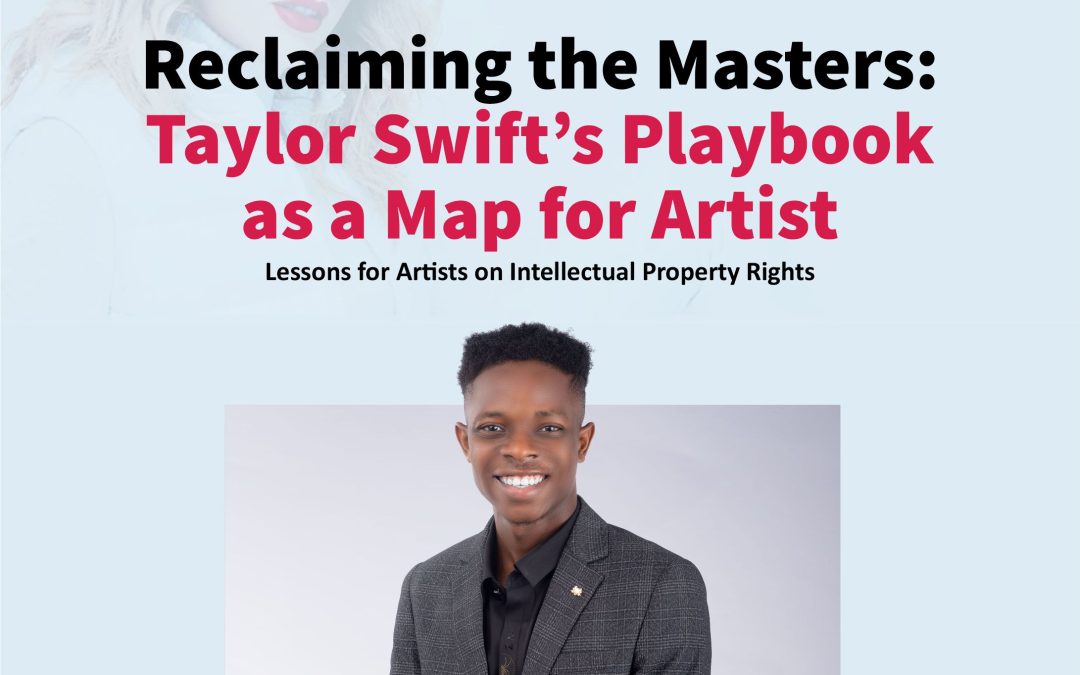
by Legalnaija | Jun 4, 2025 | Uncategorized
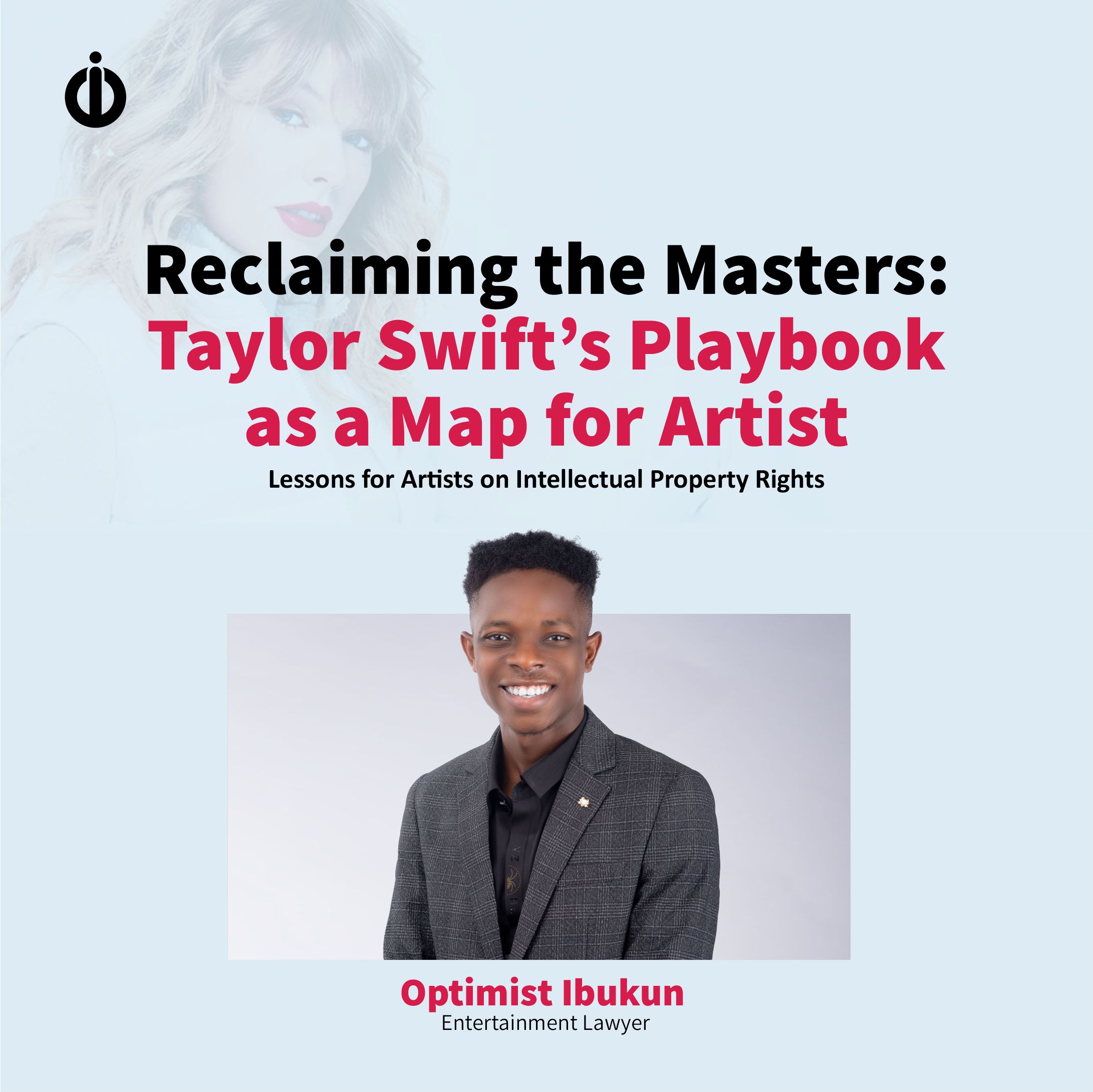
Reclaiming the Masters: Taylor Swift’s Playbook as a Map for Artists (Lessons for Artists on Intellectual Property Rights)
Introduction: Ownership of masters in musical works has always been a contentious issue in the entertainment industry. From time immemorial, artists have entered into record deals with high hopes seeking fame, financial backing, and the infrastructure to launch or boost their careers. However, many artists, in their excitement and desperation, hastily sign contracts without a proper legal review or, worse still, rely on lawyers unfamiliar with the nuances of entertainment law.
A common clause in most record deals is the assignment of ownership of the master recordings to the label, often in perpetuity. This leaves the artist stripped of control over their intellectual property sometimes for life.
The Shalipopi vs. Dapper Dispute
In 2024, a dispute between Nigerian artist Shallipopi and his record label Dapper went viral. In an open letter, Shallipopi claimed that Dapper would retain a percentage of his master recordings forever. Sadly, this isn’t new. Similar issues have occurred in Nigerian music history like the public fallout between Wizkid and Banky W, and the heated legal battle between Kizz Daniel and G-Worldwide all tied to the same ownership struggles.
Taylor Swift and the Master Rights War
Globally, one of the most well-known cases is Taylor Swift’s battle for her masters. Swift initially signed with Big Machine Records early in her career, under which she recorded her first six albums. When her deal ended in 2018, she signed a new contract with Republic Records (a division of Universal Music Group)—this time retaining ownership of any future masters.
But in 2019, Big Machine sold her original masters to Ithaca Holdings, owned by Scooter Braun. Taylor slammed the deal, stating that Braun had “stripped me of my life’s work” and that she was not even given the opportunity to buy her own masters. Legally, because she had signed away those rights, she had no control over the sale.
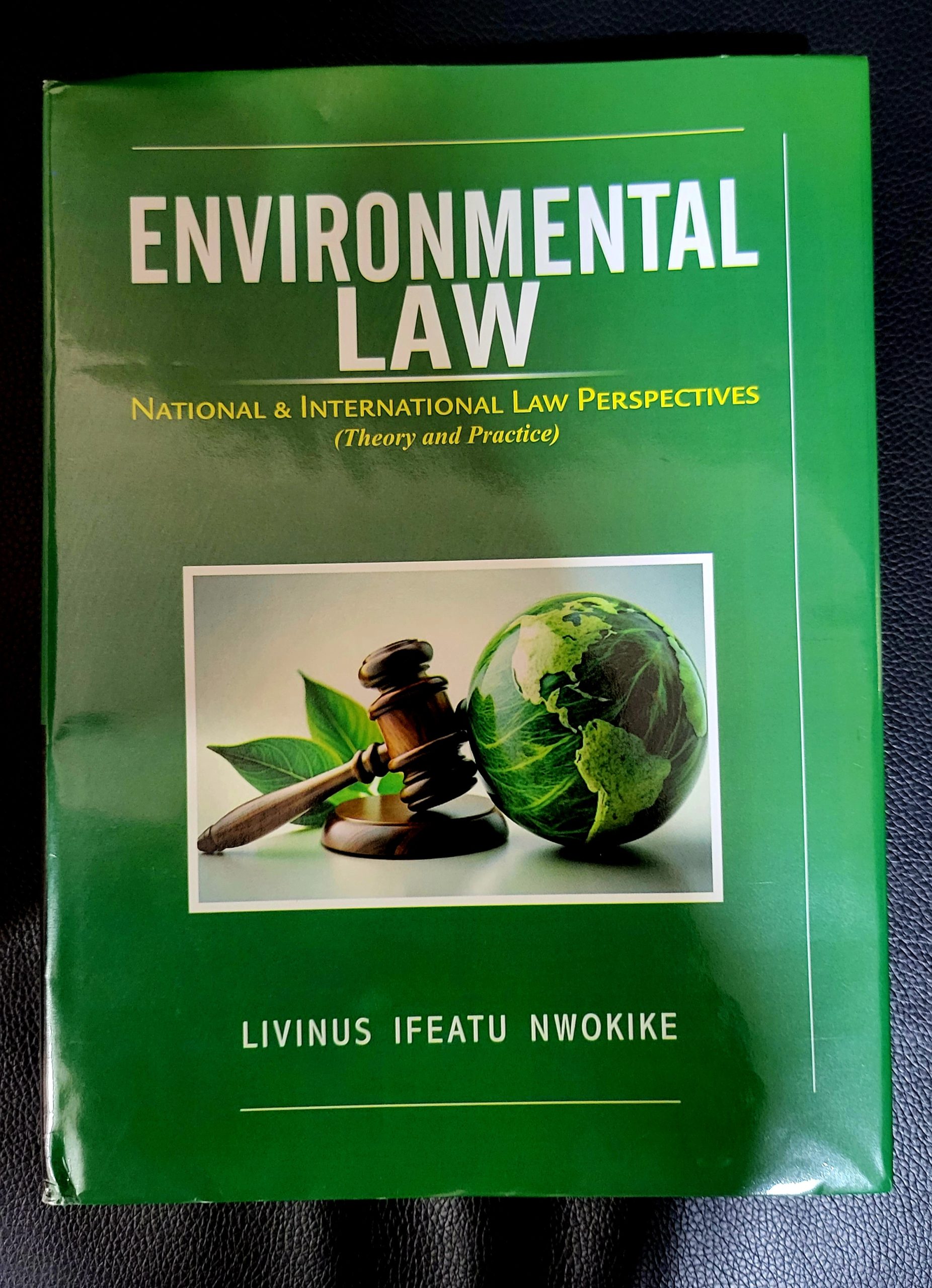
order on www.legalnaija.com/store
However, Taylor fought back by re-recording her albums under the new label. Albums like Fearless (Taylor’s Version) and Red (Taylor’s Version) were released to give fans an alternative to the original versions—and crucially, to allow Taylor to earn from the new masters she now owns.
Her action was a masterclass in intellectual property reclamation and a wake-up call for artists globally: your intellectual property is an investment, not a giveaway.
Understanding Ownership of Intellectual Property in Music
The Copyright Law of Nigeria, like that of the United States, vests initial ownership of musical works (lyrics, melody, sound recordings) in the author or creator. However, once an artist signs a contract that assigns or licenses these rights to a label, the label becomes the owner of the masters and associated IP.
This may include:
- Trademark rights to the artist’s name or branding
- Artwork and album visuals
- Licensing rights for commercial use, endorsements, or media deals
If an artist signs these rights away, the label then has full control and can sell, license, or exploit the works without needing the artist’s further permission. In Taylor Swift’s case, she likely could not claim infringement because her earlier deal legally transferred ownership to Big Machine Records.
What Artists Must Know Before Signing a Contract
Historically, record labels always seek to own the masters and associated Intellectual Property. They invest resources and want maximum control and returns. Here are key points artists must consider:
- Labels are businesses, not charities:
Their contracts are drafted to protect their investments, not yours. No matter how attractive the terms may look, do not sign without a lawyer skilled in entertainment law.
- Advances are not free money:
Any advance offered to you will be recouped from your royalties. If the deal structure is poor, you might never see any actual income.
- Perpetual ownership clauses are dangerous.
Always negotiate for a reversion clause (rights return to you after a number of years) or a buyout clause (giving you the option to purchase your masters).
- Exclusivity limits your freedom:
Labels often include clauses allowing them to license your work to third parties. Make sure these deals are limited to the term of your agreement and include your consent for key usages.
Intellectual Property Is an Asset
Your intellectual property is a valuable, appreciating asset. Like real estate, it can be inherited, sold, leased, or mortgaged. If your masters are transferred to a label, they legally own it and can exploit it without your say.
This is why Taylor Swift couldn’t stop the sale of her original recordings she no longer owned them. The label didn’t need her consent.
Likewise, any artist who signs away their rights should understand: any sampling, interpolation, or mashup of your music will result in compensation being paid to the current owner, not you.
Taylor Swift’s Playbook as a Map for Artists
Taylor Swift’s decision to buy back her catalogue (by re-recording) is a game-changer. It shows that even if you signed a bad deal in the past, you may still recover your IP through strategic negotiation and legal routes.
Her move has inspired a new wave of creators especially upcoming artists to:
- Ask for reversion clauses
- Include buy-back options
- Demand clear timelines for IP control and usage
But can every artist reclaim their Catalogue? Maybe. It depends on the original contract and how well your legal team can negotiate with the current rights holders. It’s not always possible but it’s worth trying.
Conclusion
The fight for ownership of masters is not just a legal battle—it’s a battle for control, legacy, and wealth. Artists must:
- Understand that IP is their estate
- Never treat contracts lightly
- Engage entertainment lawyers who understand the terrain
Remember, your master recordings are your legacy. Don’t be so eager for fame or a Cheque that you sign away your future.
Taylor Swift’s journey offers a vital lesson: if you lose your masters, fight to get them back. If you haven’t signed yet, fight to retain them.
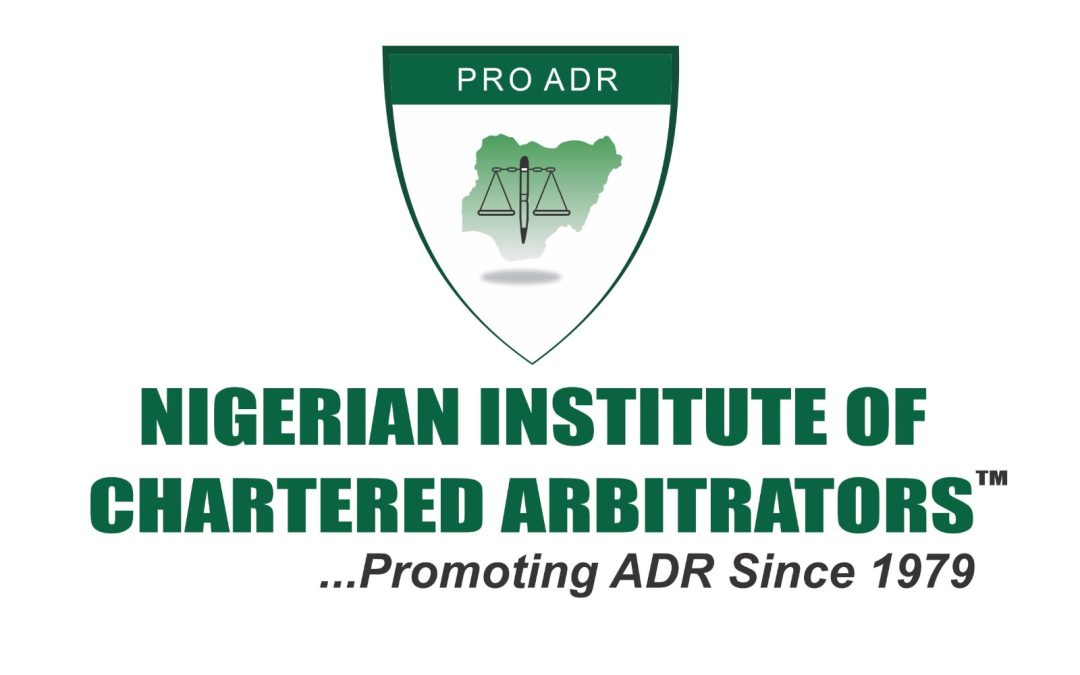
by Legalnaija | May 15, 2025 | Uncategorized
The Nigerian Institute of Chartered Arbitrators is looking to hire a Brand and Communications Executive, see details below;
JOB TITLE: Brands & Communications Executive
JOB TYPE: Full Time
QUALIFICATION: LLB/ BA/BSc/HND plus any relevant certifications
EXPERIENCE: 3- 5 years
LOCATION: Lagos, Nigeria
INDUSTRY: Legal / Arbitration / Communications / Media
APPLICATION DEADLINE: 30th May 2025
BRIEF ABOUT NIGERIAN INSTITUTE OF CHARTERED ARBITRATORS (NICArb.)
The Nigerian Institute of Chartered Arbitrators (NICArb) is Nigeria’s premier arbitration institute, founded in 1979. NICArb is committed to promoting and advancing the practice of arbitration and alternative dispute resolution (ADR) in Nigeria and across Africa. As we expand our digital presence, we seek a dynamic, creative, and self-driven NYSC Corps Member to join our team as a Social Media Manager.
JOB DESCRIPTION:
The Brand and Communications Executive will develop communications strategies to enhance NICArb’s brand image, customer engagement, and business objectives. The executive will also ensure consistency in messaging across all channels and manage the company’s digital presence. This role involves creating compelling content, building brand awareness, and promoting events and services.
RESPONSIBILITIES:
- Develop and implement a social media strategy that aligns with NICArb’s brand identity and organizational goals.
- Manage daily operations across all social media platforms (Instagram, Twitter, LinkedIn, Facebook, YouTube, etc.).
- Create engaging and informative content (text, image, video, graphics) tailored to each platform.
- Collaborate with the “Training, Membership & ADR Centre teams” to promote training programmes, webinars, events, publications, and membership recruitments.
- Schedule and publish posts using content calendars and scheduling tools.
- Monitor, track, and provide performance analytics.
- Respond to comments, messages, and inquiries promptly and professionally.
- Stay updated with social media trends, best practices, tools, and industry developments.
- Assist in designing graphics and visuals for digital campaigns (using tools like Canva, Adobe Suite, etc.).
- Manage paid social media advertising campaigns.
- Ensure brand consistency across all digital platforms.
- Support live coverage of events through social media (live tweeting, stories, real-time posting).
- Assist with email marketing and newsletter content.
- Possess sufficient research skills and experience.
- Media relations and offline media experience
REQUIREMENTS:
- Degree in Law, Mass Communication, Marketing & Digital Media.
- Strong writing, editing, video editing, and storytelling skills.
- Ability to create visually appealing content using relevant tools.
- Experience with social media management tools (e.g., Buffer, Hootsuite, Meta Business Suite).
- A passion for communications, branding, digital trends, and the ADR/legal space is advantageous.
WHAT WE OFFER:
- A professional and dynamic working environment.
- Mentorship and opportunities for learning and growth.
- A chance to build a strong portfolio and gain valuable experience in the legal and arbitration field.
TO APPLY:
Interested candidates should send a CV and a one-page suitability statement to Hr@nicarb.com
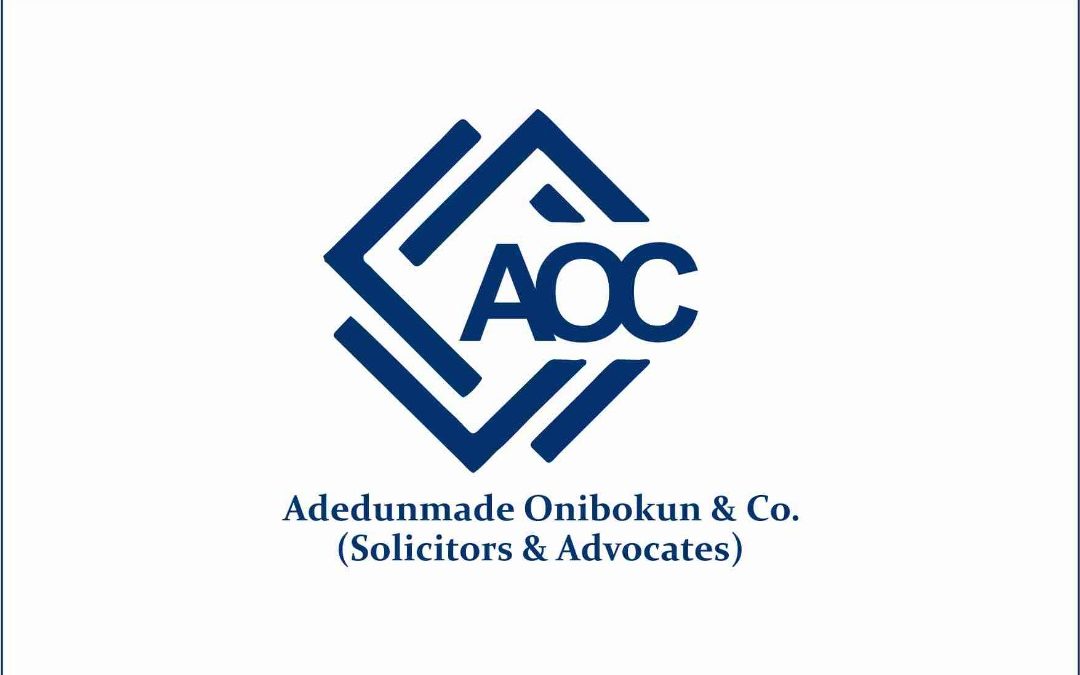
by Legalnaija | Jan 22, 2025 | Uncategorized
INTRODUCTION
A company may decide to restructure its corporate outlook after its incorporation; this might either be as a result of the company’s financial state or due to depletion in the company’s economic growth.[1] Company restructuring may be internal or external. Internal restructuring options include; share consolidation; increase or reduction of share capital; arrangement and compromise under section 710 of CAMA, 2024 while external restructuring options include; Amalgamation or merger; take over; Acquisition, Arrangement on sale and Purchase and Assumption[2]. This article focuses on Mergers and Acquisition.
MERGERS
Section 119 of Investment and Securities Act defines ‘merger’ to mean any amalgamation of the undertakings or any part of the undertakings or part of the undertakings of one or more companies and one or more bodies corporate. In simple words, a merger is the coming together of two or more companies to form a single corporate entity.
ACQUISITION
An acquisition is an arrangement whereby one company acquires the controlling holding of shares in another company. In simple words, an acquisition occurs when one company acquires sufficient shares in another company such that it acquires control of the other company[3]. An acquisition may be initiated either by a take-over bid or by purchasing shares in the market. In most cases, the acquired company is usually a smaller company and becomes a subsidiary of the acquiring company.
OVERVIEW AND IMPORTANCE OF MERGERS AND ACQUISITION IN NIGERIA
Mergers and Acquisitions (M&A) are instrumental to corporate restructuring, enabling businesses to achieve growth, diversify, or gain competitive advantages. In Nigeria, M&A plays a significant role in the corporate landscape, particularly as companies seek to navigate a complex and competitive economy. These transactions, however, are governed by a legal framework designed to ensure transparency, protect stakeholders, and maintain competitive balance in the market.
The direct government intervention in the economy due to recapitalization in sectors like banking, insurance and aviation has led to increase in mergers in the country.
Importance of Mergers and Acquisitions in the Nigerian Economy
- Increase in scale of production by greater specialization in plant and marketing economy through a reduction in advertising costs and distribution outlets.
- It enhances corporate growth in the economy.
- It boosts confidence in the market.
- It enhances more and efficient reallocation of resources.
- It provides a level ground for companies interested in merging regardless of their financial state.
- It gives rise to healthy market competition thereby improving the quality of products and services delivered.[4]
LEGAL FRAMEWORK FOR MERGERS AND ACQUISITION IN NIGERIA
- Corporate and Allied Matters Act (CAMA) 2020
The Corporate and Allied Matters Act (CAMA) is the principal law regulating companies in Nigeria[5]. Under CAMA, the legal procedures for corporate restructuring[6], including mergers and acquisitions, are clearly defined. CAMA requires companies to follow specific statutory procedures, including the passing of resolutions by shareholders, obtaining necessary approvals, and filing requisite documentation with the Corporate Affairs Commission (CAC). CAMA also provides protections for minority shareholders, ensuring that their interests are safeguarded during such transactions.
- Investments and Securities Act (ISA) 2007
The Securities and Exchange Commission (SEC), established under the ISA, also plays a critical role in M&A regulation in Nigeria. SEC approval is mandatory for many M&A transactions, particularly where public companies are involved or where securities are exchanged as part of the transaction. SEC ensures that M&A transactions are conducted transparently, with proper disclosure of material information to protect investors and other stakeholders[7].
- Federal Competition and Consumer Protection Act (FCCPA) 2018
The FCCPA established the Federal Competition and Consumer Protection Commission (FCCPC), which oversees competition and consumer protection in Nigeria. One of the core functions of the FCCPC is to regulate M&A transactions to prevent anti-competitive practices. Section 93 (4) of the FCCPA provides that mergers above a certain threshold must be notified to the FCCPC for approval. The FCCPC evaluates M&A deals to ensure that they do not substantially lessen competition, create monopolies, or harm consumers.
- Nigerian Stock Exchange (NSE) Rules
For companies listed on the Nigerian Stock Exchange, additional rules apply. The NSE requires listed companies to comply with disclosure obligations, including the need to announce merger or acquisition deals, provide updates to the public, and disclose relevant financial and operational information. This ensures market transparency and investor protection.
- Bank and Other Financial Institution Act (BOFIA)
This act regulates the Central Bank of Nigeria and other financial institutions by providing general guidelines for them.
REGULATORY AGENCIES INVOLVED IN MERGERS AND ACQUISITIONS
- Corporate Affairs Commission (CAC)
CAC is charged with responsibilities of issuing certification of corporate resolution, deregistration of companies dissolved.
- Securities and Exchange Commission (SEC)
Every merger acquisition or external restructuring between or among companies shall be subject to the prior review and approval of the Commission. Approval for mergers, acquisition or external restructuring shall be given if, the Commission finds that;
- Such acquisition, whether directly or indirectly, of the whole or any part of the equity or other share capital or of the assets of another company, is not likely to cause substantial restraint of competition or tend to create monopoly in any line of business enterprise;
- The use of such shares by voting or granting proxies or otherwise shall not cause substantial restraint of competition or tend to create monopoly in any line of business enterprise
- Though the contemplated merger is likely to restrain competition, one of the parties to the merger has proved that it is failing[8].
- Federal High Court
Section 251 of the constitution vests in the Federal High court the powers to adjudicate issues regarding companies.
- Nigerian stock Exchange
Nigerian Stock Exchange provides the platform in Africa for raising capital. It facilitates a thriving secondary market for trading securities and maintains a seamless flow of market information.
- Central Bank of Nigeria(CBN)
CBN is charged with the responsibility of administering the Banks and Other Financial Institutions Act (BOFIA), 2020, with the sole aim of ensuring high standards of banking practice and financial stability through its surveillance activities, as well as the promotion of an efficient payment system.
- Federal Competition and Consumer Protection Commission
The Commission evaluates mergers and acquisitions in Nigeria to ensure that they do not significantly diminish competition in the relevant market.
Categories of Mergers
There are three (3) categories of Mergers based on the threshold set by the Federal Competition and Consumer Protection Commission (FCCPC)[9], these categories are;
- Small Merger
Section 95 (1) (a) of Federal Competition and Consumer Protection Act, 2018 classified a ‘small merger’ as a merger that does require a notification to the commission unless, within the six month period from implementation of the merger, as the commission is of the opinion that the merger may substantially prevent or lessen competition.
- Intermediate Merger
An intermediate merger according to section 120 (1) of ISA is merger or a proposed merger with a value between the lower and upper thresholds of 500,000 and 5,000,000 respectively.
- Large Merger
Section 120 (1) of ISA defines a large merger as a merger with a value at or above the upper threshold of 5,000,000.
Forms of Merger
There are three (3) forms of merger according to Rule 227 of SEC Rules. They include;
- Horizontal Merger
This is a form of merger involving direct competitors i.e companies operating in the same market level and selling the same products or providing same services[10].
- Vertical Merger
This is a form of merger involving companies with no competitive relationship. Although the companies involved operate in the same market, they do not sell products or offer services in the same market level[11].
- Conglomerate Merger
This is a form of merger involving unrelated companies[12].
Procedures for Mergers and Acquisition under ISA and SEC Rules
- The merging companies would first internally make a merger proposal to their separate boards to consider and approve.
- It is encouraged that the legal representatives of the merging companies conduct due diligence exercise to determine and confirm the status of the merging companies.
- The merging companies shall file with the Commission, a merger notification for the commission’s evaluation.
- An application is then made to the court by any of the merging companies to sanction the scheme.
- The court will order that all merging companies hold separate meetings with majority of its members representing not less than ¾ in value of shares of members being present and voting either in person or by proxy at each of the separate meetings.
- Where ¾ in value of shares of members being present and voting either in person or by proxy agree to the scheme at the separate meetings, it shall be referred to the Securities and Exchange Commission (SEC) for approval.
- Upon receiving the approval of the scheme from the merging companies, SEC shall investigate to find out if the scheme is likely to cause a substantial restraint or enable a monopoly.
- If the merger involves transfer of shares or any class of shares in a transferor company and not less than 9/10 in the value of the shares involved, the transferee company may at any time within two months after the expiration of the four months compulsorily acquire the shares of the dissenting shareholders.
- If SEC approves the scheme, any of the merging companies will apply to the court to sanction the scheme.
- The merging companies are to comply with post-approval requirements[13].
Requirements for Merger Notification[14]
The merger notification shall be filed by submitting a report containing the following to SEC;
- a letter of intent signed by the merging companies accompanied by board resolutions of the merging companies supporting the merger;
- a detailed Information Memorandum of the proposed transaction including all the background studies relating to the merger, and justification for it which shall include the following:-
- detailed information about product lines or operations of the companies;
- a list of the major competitors in that product market and the market position or market share of each company;
- the structure and organization of the companies;
- revenue information about the operations of the companies;
- an analysis of the effect of the transaction on the relevant market including the post transaction market position of the merging or resultant company;
- additional information to be disclosed/contained in an information memorandum which shall include the following:
- State the products or services that the merging entities sell or provide in, into or from Nigeria. In addition, identify any products or services that you believe are considered by buyers as reasonably interchangeable with, or a substitute for, a product or service provided in, into or from Nigeria by parties to the merger;
- For each identified product or service, state the geographic area (s) in Nigeria, in which the merging entities sell;
- For each identified product or service, identify and provide contact details of the top five producers or providers in each identified geographical area with the largest estimated turnover in value, and their estimated share of the total turnover during the last financial year;
- For each identified product or service, state the turnover in each of the identified geographical area during the last financial year;
- For each identified product or service, identify and provide contact details for the merging entities’ five customers in each of the identified geographical area with the largest aggregate purchases in value during the last financial year;
- The business relationship among the merging entities in terms of the products or services they sell to one another as well as the value of those products and services sold during the last financial year.
- The note shall also indicate whether the merger will involve the following:
- Transfer of all or part of the assets, liabilities, undertakings, including real and intellectual property rights;
- Transfer of shares or other interests.
- Where a company involved in the merger transaction claims that it is failing, the following documents shall be forwarded:
- Financial information demonstrating that the firm will be unable to meet its financial obligations in future;
- Information indicating that the failing firm would reasonably be expected to exit the market unless the merger is implemented.
- The latest financial statement of the companies;
- Certificate of the corporation of the merging companies.
- Where a party to a small merger is required by the Commission to notify it of the merger, documents forwarded shall be the same as those required for a merger notification:
- Extract of board resolutions of the merging companies authorizing the merger duly certified by a director and the company secretary;
- A copy of the letter appointing the Financial Adviser(s);
- Copy of certificate of incorporation certified by the company secretary;
- CAC certified true copy of particulars of directors and allotment of shares;
- Letter of no object from company’s’ regulators.(where applicable); 276 SEC Rules; June 2013
- The audited accounts of the merging entities for the preceding five (5)years or the number of years any of the companies have been in operation if less than five (5)years;
- Applicable merger notification fee of N50,000 (fifty thousand naira) per merging company (for intermediate and large mergers);
- In the case of an intermediate or large merger a copy of the merger notification shall be forwarded to:
- Any registered trade union that represents a substantial number of its employees; or the employees concerned or representatives of the employees concerned, if there are no such registered trade unions.
- Additional information to be disclosed in the Information Memorandum includes:
- The actual and potential level of import competition in the relevant industry;
- The ease of entry into the industry, including tariff and regulatory barriers;
- The level and trends of concentration and history of collusion in the relevant industry;
- The degree of countervailing power in the market; v. The dynamic characteristics of the relevant industry including growth, innovation and product differentiation;
- The nature and extent of vertical integration in the relevant industry; vii. Whether the business or part of the business of a party to the merger or proposed merger has failed or is likely to fail; viii. Whether the merger will result in the removal of an effective competitor;
- Any other information that the Commission may require in respect of the Merger.
- Merger applications may be filed by separate financial advisers (registered as an issuing house) or solicitor registered with the Commission for each of the merging companies, provided that in case of a small merger one (1) financial adviser may be used[15].
Key Legal Issues in M&A Transactions
- Due Diligence
Before concluding M&A transaction, it is important that the merging companies conduct thorough due diligence. This process involves a detailed review of the target company’s legal, financial, and operational standing. Legal due diligence ensures that the company complies with all applicable laws, has clear title to its assets, and is free of significant liabilities. Failure to conduct comprehensive due diligence can result in significant post-transaction risks.
- Shareholder Approval
The Securities and Exchange Commission is charged with the responsibility of ensuring that ¾ of shareholders agree to the M&A before a mergers and acquisition scheme is approved[16].
In the case of mergers, CAMA mandates that the shareholders of both merging companies pass special resolutions approving the merger. Minority shareholder protection is also a key consideration, as dissenting shareholders can object to the transaction and may be entitled to a buyout or other remedies as ordered by the court.
- Regulatory Approvals
M&A transactions above certain thresholds must obtain approval from regulatory bodies such as the FCCPC and SEC[17]. In sector-specific industries, additional approvals from regulators like the CBN may be required. The process involved in securing these approvals can slow down the transaction, adding to the complexities of the process.
- Contract Issues
The negotiation and drafting of M&A agreements are key legal steps in the process. It is important that M&A Agreements include representations and warranties of parties, conditions precedent and indemnities. It should also provide for Post-closing obligations, such as earn-out provisions or non-compete agreements, are also common in M&A deals. This ensures there is no ambiguity in the roles and obligations of parties in the merger.
- Employment and Labor Considerations
When companies merge, the employees of the target company are often affected. The Nigerian labor laws, including provisions under the Labour Act, ensure that employees are treated fairly during corporate restructuring. Mergers and acquisitions may result in redundancies or changes to employment contracts, and companies must comply with these regulations to avoid labor disputes[18].
- Tax Implications
Tax efficiency is a critical consideration in M&A transactions. Companies must consider the tax obligations arising from the transaction, including capital gains tax, value-added tax (VAT), and company income
- Competition Law and Antitrust Concerns
FCCPC evaluates M&A transactions in Nigeria to ensure that they do not create monopolies or substantially reduce competition in the market. Companies involved in anti-competitive mergers may face penalties, and the transaction could be blocked or reversed[19].
CONCLUSION
In conclusion, mergers and acquisitions (M&A) are vital tools for corporate restructuring in Nigeria, allowing companies to enhance their growth, competitiveness, and market presence amidst a challenging economic landscape. Governed by a robust legal framework, including the Corporate and Allied Matters Act (CAMA) and the Investments and Securities Act (ISA), these transactions require careful adherence to regulatory approvals, shareholder agreements, and due diligence processes to ensure compliance and protect stakeholder interests. M&A can take various forms, including mergers, acquisitions, and amalgamations, and are categorized based on their financial thresholds, emphasizing the need for strategic planning to optimize resource allocation and market position. Ultimately, successful M&A activities can stimulate economic growth, improve market confidence, and foster healthy competition, contributing to the overall stability and development of the Nigerian economy.
[1] Corporate Law Practice in Nigeria, Samuel A. Osamolu at p. 399
[2] Ibid at p. 399-400
[3] Legal Framework on Mergers and Acquisitions by Professor C. O Okonkwo accessed on 7th October, 2024 at https://www.cbn.gov.ng/out/publications/bsd/2005/legal%20framework%20for%20mergers%20%20acquisitions.pdf
[4] Corporate Law Practice in Nigeria, Samuel A. Osamolu at p.410
[5] Section 8, CAMA, 2020
[6] Section 710- 717 CAMA, 2020
[7] Section 119-130, ISA ACT, 2007
[8] Rule 423, SEC RULES 2013.
[9] Section 93 (4) Federal Competition and Consumer Protection Act, 2018
[10] Rule 421, SEC RULES, 2013.
[11] Ibid
[12] ibid
[13] Part XII of the Investment and Securities Act (ISA) No. 29, 2007, Part I of the Rules & Regulations of the Securities & Exchange Commission 2013 (as amended)
[14] Section 426, Part I of the Rules & Regulations of the Securities & Exchange Commission 2013 (as amended)
[15] Section 426, Part I of the Rules & Regulations of the Securities & Exchange Commission 2013 (as amended)
[16] Part I of the Rules & Regulations of the Securities & Exchange Commission 2013 (as amended)
[17] Section 427, Part I of the Rules & Regulations of the Securities & Exchange Commission 2013 (as amended)
[18] Section 20, Labour Act, 1974
[19] Mergers Review Guidelines, Federal Competition and Consumer Protection Commission,2020
Via www.aocsolicitors.com.ng

by Legalnaija | Jan 22, 2025 | Uncategorized
INTRODUCTION
In Nigeria, the landscape of employee compensation is shaped by combination of statutory provisions, industry practices, and economic factors. Understanding the legal consideration and the practical realities surrounding employee compensation is essential for both employer and employee. The employee compensation Act, of 2010, is a social; security/welfare scheme that provides comprehensive compensation to employees who suffer from accidents at the workplace or in the course of employment. The basis or justification for compensation is the employer’s duty of care.
Compensation under employment refers to the total rewards that employees receive in exchange for their labor and services. It encompasses both direct and indirect forms of payment and serves as a critical element of human resource management (Adair & Satyanarayana, 2018). Compensation impacts employee performance, motivation, and satisfaction, making it an essential component for organizational effectiveness.
Employee Compensation
Employee compensation serves as a critical aspect of labor law, aimed at ensuring that Employees receive adequate financial and healthcare support when they suffer workplace injuries or illnesses. In Nigeria, the Employees’ Compensation Act (ECA) of 2010 stands as a primary legislative framework to provide an equitable system of compensation for employees in the case of work-related accidents, injuries, and diseases. The Act replaced the earlier Workmen’s Compensation Act (WCA) due to its limitations and narrow focus, extending coverage to a broader scope of employment situations and types of injuries (Deloitte Corporate ServicesLimited [DCSL], 2012).
Components of Compensation
Compensation is generally divided into two primary types: direct compensation and indirect compensation.
Direct compensation includes monetary rewards such as base salary, bonuses, commissions and profit-sharing schemes. These financial incentives are designed to recognize and reward individual performance, aligning employee efforts with organizational goals (Adair & Satyanarayana, 2018). Indirect compensation, on the other hand, consists of non-monetary benefits, such as health insurance, retirement benefits, and paid leave. These benefits enhance job satisfaction and contribute to overall employee well-being by addressing various personal needs (Brown, 2003). Theories Related to Compensation, Several theories provide a foundation for understanding compensation' s impact on employee behavior. Reinforcement theory, proposed by B.F. Skinner, suggests that behavior can be motivated by rewards. When high performance is followed by positive reinforcement, such a monetary reward, employees are more likely to repeat this behavior in the future (Adari & Satyanarayana, 2018). Expectancy theory, developed by Victor Vroom, highlights that employees are motivated by expected rewards and are more likely to perform if they believe their efforts will lead to desired outcomes (Harrison & Liska, 2008). Finally, equity theory, introduced by John Stacey Adams, posits that employees assess fairness in their compensation by comparing their input-output ratio with that of others. Fair and competitive compensation packages can therefore enhance job satisfaction and reduce turnover (Adari & Satyanarayana, 2018).
LEGAL FRAMEWORK
Nigeria’s labor laws are primarily governed by the Labor Act, which sets the foundation for employment relationships. The Act outlines provisions related to wages, working hours, leave entitlements, and termination procedures. In addition, the Employee Compensation Act of 2010 specifically addresses compensation for work-related injuries, disabilities, or death, establishing a framework for employer liability in such cases. The Employees’ Compensation Act, 2010, was signed into law on 17th December 2010. This Act repeals the Workmen’s Compensation Act Cap. W6 Laws of the Federation of Nigeria, 2004, and makes comprehensive provisions for payment of compensation to employees who suffer from occupational diseases or sustain injuries arising from an accident at the workplace or in the course of employment. Guidelines for the Release of Staff in the Nigerian Oil and Gas Industry 2019 issued further to the provisions of the Petroleum (Drilling and Production) Regulations 1969 (as amended), made under the Petroleum Act, Cap P10, LFN 2004 (now the Petroleum Industry Act, 2021); Nigeria Data Protection Regulation 2019 issued by the National Information Technology Development Agency.
Categories of compensation
- Compensation for death
In the event that an employee dies in an occupational accident or of an occupational disease, the family members are paid: a funeral allowance and a pension. Persons considered to be family members are specified in the Workers’ Compensation Act. Notably, the provision of section 7 of the Act widens the scope of liability of an employer to the employee, providing that:
Section 7 (1) Any employee, whether or not in a workplace, who suffers any disabling injury arising out of or in the course of employment shall be entitled to payment of compensation by Part IV of this Act.
(2) An employee is entitled to payment of compensation concerning any accident sustained while on the way between the place of work and:
(a) The employee’s principal or secondary residence
(b) The place where the employee usually takes meals; or
(c) The place where he usually receives remuneration provided that the employer has prior notification of such a place.
Scale of Compensation: The scale of compensation for an injury, disease, or death suffered in the course of employment is provided under Part IV of the Act. Section 17 of the Act provides for compensation in fatal cases, stating that where death results from an injury of an employee, compensation shall be paid to the dependents of the deceased. The compensation paid to the employee’s widow (err) or children ranges from 30% – 90% of the employee’s total monthly remuneration as of the date of death, although this is dependent on the circumstances of the dependents. Section 17 – 25 of the Act. Where the compensation offer is accepted, this further bars the affected employee or his siblings from instituting any legal action against the employer in respect of the same subject matter.
Employer’s Liability: Employers are held liable for providing compensation to employees affected by work-related incidents. The Act specifies the obligations of employers in promptly reporting accidents, facilitating medical examinations, and ensuring compliance with the compensation process. Section 5 of the Act
Establishment of the Employees Compensation Fund: The legislation mandates the creation of the Employees Compensation Fund, managed by the Nigeria Social Insurance Trust Fund (NSITF). The fund serves as the financial pool from which compensation payments are made to eligible employees. Section 56 – 63 of the Act
Compensation Administration: The Act establishes the administrative structure for the implementation of the compensation scheme. This includes the role of the NSITF in managing the fund, adjudicating claims, and overseeing the overall compensation process. However, more recent studies by Nnedinma Umeokafor, over an 11-years period [2002-2021], found that of the reported accidents: 80% occurred at night; manufacturing of rubber products accounted for the highest number of injuries at 53.8% for death. Sections 31 and 32 of the Act
One notable achievement is the clear articulation of the compensation process, providing a structured mechanism for addressing work-related incidents. The legislation establishes a no-fault compensation scheme, shifting the focus from attributing blame to swiftly compensating employees. This is a positive departure from traditional legal processes that could be protracted and adversarial. In Nigeria there is a dearth of accurate information involving fatalities arising from work injuries. One responsible cause is the underreporting of cases by private business and government agencies. However, according to Ezenwa A.O, between 1987 and 1996, the annual case fatality rate ranged from 0.94 per 100 injured workers 1990 to 5.41 in 1994 with an overall fatality rate of 2.23 per 100 injured workers.
- Compensation for injury:
It is common for workers to suffer injury or incur liabilities during the course of employment. This is more common with employee’s whose employment requires them to work with delicate and complex medium and heavy duty machinery, such as workers on an oil rig, a manufacturing company, a laundry service or even a restaurant.
The Act provides in section 7, that:
. Any employee, whether or not in a work place, who suffers any disabling injury, occurred, as the Act provides other instances when the employee will be liable to compensation for injury suffered.
The Act provides in subsection {2} that:
“An employee is entitled to payment of compensation with respect to any accident sustained while on the way between the places of work. In c & c const. co Ltd. V. okhai {2003} 18 NWLR [pt.851]79, the respondent, while on duty which involved the serving of the appellants crane sustained grievous injuries arising out of the 2nd appellant failure as switch operator to use due care thereby causing the crane to become agitated and resulting in a drum of the crane to rollover violently over the respondents’ left foot, crushing that leg below the knee. For this he was under great pain and suffering for which he was hospitalized and this eventually led to the amputation of that leg. The employee was awarded damages for loss of earning capacity, future loss and damages for pain and suffering.
Impact of Compensation on Employee Performance
Compensation is not only a reward but also a tool for driving employee performance. Research suggests that competitive compensation packages attract and retain high-performing employees, contributing to organizational success (Pearce, 2010). Employees who feel adequately compensated are more likely to exhibit higher levels of motivation, engagement, and productivity (Brown, 2003). Moreover, when compensation is linked to performance, such as through merit pay or profit-sharing programs, employees become more focused on achieving organizational objectives (Adari & Satyanarayana, 2018).
For example, merit pay, a common performance-based compensation method, has been shown to encourage employees to meet or exceed performance benchmarks. Profit-sharing plans, though more indirectly tied to individual performance, foster a sense of ownership and alignment with organizational goals among employees (Adari & Satyanarayana, 2018). However, to maximize these effects, compensation systems must be thoughtfully designed to balance financial incentives with intrinsic motivators, ensuring sustained employee motivation an minimizing unhealthy competition within the workplace (Adari & Satyanarayana, 2018).
The Nigerian Employees’ Compensation Act of the Nigerian Employees’ Compensation Act, 2010 (ECA) offers a legal framework for compensating employees who suffer injuries, disabilities, diseases, or death as a result of their employment. This Act, enacted to replace the Workmen’s Compensation Act of 1987, aims to protect employees through a structured compensation scheme. The ECA aims to create an "e; open and fair system of guaranteed and adequate compensation for all employees or their dependants" in instances of death, injury, disability, or illness arising from the course of employment (DCSL, 2012).This compensation includes not only financial benefits but also rehabilitation services, which extend to both physical and mental health support. Unlike the WCA, which had a narrow focus primarily on physical injuries, the ECA covers mental health issues directly linked to traumatic workplace events or ongoing workplace conditions. For instance, mental stress is considered compensable if it results from a traumatic event in the workplace, making this legislation comprehensive in its approach to employee welfare (DCSL, 2012).
Objective of the Act
The primary purpose of the ECA is to provide compensation for employees who suffer from work-related injuries, diseases, or fatalities. Anushiem and Oamen (2017) explain that the Act intends to provide a more inclusive and effective compensatory regime, which was a significant departure from the employer-friendly nature of the repealed Workmen’s Compensation Act. The ECA aims to create a balanced framework benefiting both employees and employers, with specific objectives outlined in Section 1 of the Act. These objectives include ensuring fair compensation for injuries, establishing a compensation fund, and creating mechanisms for rehabilitation and prevention (Anushiem & Oamen, 2017). How the Nigerian Employees’ Compensation Act 2010 Transmits to Compensation Under Employment. The Employee Compensation Act (ECA) of 2010 creates a structured way for Nigerian employees to receive compensation if they experience work-related death, injury, disease, or disability. It translates into an employment compensation framework by mandating financial protection measures that employers must implement. Here's how this framework transmits to practical compensation under employment:
- Mandatory Contributions: The ECA obligates all Nigerian employers (both public and private sector) to contribute 1% of each employee' s monthly salary to the Employee Compensation Fund. This fund is managed by the Nigerian Social Insurance Trust Fund (NSITF) Board and provides resources to compensate employees or their dependents in cases of workplace-related incidents.
- Compensation Coverage: Compensation under the Act applies if an employee experiences harm due to work activities. This includes: o Death: The Act mandates financial support for dependents of employees who pass away from work-related injuries. Section 17 specifies that dependents, such as spouses or children, may receive 30-90% of the deceased employee’s monthly remuneration, depending on their circumstances. O Injury and Disability: The Act provides for compensation to employees suffering from work-related injuries or disabilities that impact their ability to work. This allows affected employees to maintain financial stability while recovering or adapting to long-term changes in their work capabilities. o Disease: For work-related diseases, the Act ensures compensation for medical expenses and other costs arising from the diagnosis and treatment of conditions linked to employment.
- Legal Limitation on Further Claims: Acceptance of compensation under the ECA means that the employee (or dependents) agrees to forego any further legal claims against the employer for the same incident. This protects the employer from repeated liability and provides employees with an expedited, guaranteed source of compensation without lengthy legal battles.
Scope and Application of the Act
The ECA applies to both public and private sector employees in Nigeria, encompassing a broad definition of & quote; employee & quote; to include anyone under contract, whether oral or written, continuous, temporary, or part-time (Anushiem & Oamen, 2017). However, military personnel in non- civilian capacities are excluded from the Act’s protections. This broad coverage ensures that nearly all employees have access to compensation for injuries or diseases arising out of their employment.
Administration and Compliance Requirements
The Nigeria Social Insurance Trust Fund (NSITF) Management Board is tasked with administering the ECA. Employers are mandated to contribute at least 1% of their total monthly payroll to the Employees’ Compensation Fund (ECF) within the first two years of the Act’s commencement. This fund is used to provide financial support and medical assistance to employees impacted by workplace injuries. The NSITF also has the discretion to adjust contribution rates based on the risk level associated with specific industries. Penalties are imposed on employers for non-compliance, including fines, penalties on unpaid assessments, or even imprisonment for responsible officers who neglect to make required contributions or provide payroll data (DCSL, 2012). Criticisms and Challenges of the ECA While the ECA represents a significant improvement over the WCA, several critiques exist. One major concern is the management of the ECF by the NSITF Board, which some argue lacks adequate transparency and efficiency. Another issue is the broad discretion given to the NSITF to adjust employer contributions, potentially leading to inconsistent assessments and unpredictability for employers. Moreover, unlike the WCA, the ECA does not provide a detailed schedule of compensations for various types of injuries and disabilities, which may lead to inconsistencies in compensation amounts and potential disputes between employers and employees (DCSL, 2012).
Despite the ECA’s progressive provisions, several operational issues still affect its effectiveness. Anushiem and Oamen (2017) highlight these key areas:
- Appeal Procedure: Section 55 of the ECA provides a unique appeal structure, where aggrieved employees must first appeal to the Nigerian Social Insurance Trust Fund (NSITF) Board before approaching the National Industrial Court. Critics argue that this procedure conflicts with fair justice principles because the Board acts both as a party and judge in initial appeals. Anushiem and Oamen (2017) argue that this could lead to partiality, proposing instead that a pre-action notice should replace the internal appeal requirement.
- Compensation for Mental Stress: Section 8 of the ECA covers compensation for mental stress but lacks a clear definition, leaving interpretation to the NSITF Board. This provision allows for compensation if mental stress is a direct reaction to a traumatic event at work. The ambiguity, however, may limit practical enforcement, as the Board has significant discretion to determine eligibility for mental stress compensation (Anushiem & Oamen, 2017).
- Occupational Diseases and Schedule Limitations: The Act lists compensable occupational diseases, yet it does not meet international standards, excluding several recognized conditions such as mental and behavioral disorders. Section 9 of the Act requires that these diseases must result in either death or disability for compensation eligibility. This limited list restricts the rights of employees suffering from unlisted conditions, potentially excluding valid claims (Anaheim & Oamen, 2017).
CHALLENGES AND REALITIES
However, the effectiveness of these laws faces challenges in practical implementation. Delays in the disbursement of compensation and disputes over the extent of liability are issues that need attention. The administrative hurdles and complexities in navigating the compensation process sometimes hinder the timely delivery of benefits to affected employees. Furthermore, the scope of these laws may need to advance to address the changing nature of work. The rise of non-traditional employment arrangements, such as gig work and freelancing, presents new challenges in defining employer-employee relationships and determining liability in the event of work-related incidents.
To enhance the impact of Employee Compensation laws in Nigeria, there is a need for strengthened enforcement mechanisms. This involves ensuring that employers are aware of their obligations and are held accountable for compliance. Furthermore, streamlined and efficient processes for filing and adjudicating compensation claims can contribute to a more expeditious resolution of cases.
Public awareness campaigns can also play a crucial role in informing both employers and employees about their rights and responsibilities under these laws. Improved awareness can contribute to a culture of safety in workplaces and empower workers to assert their rights when necessary.
Despite the existence of robust legal frameworks, several challenges persist in the realm of employee compensation in Nigeria. Enforcement of labor laws can be inconsistent, especially in smaller enterprises or informal sectors where oversight is limited. This inconsistency sometimes leads to exploitation and unfair practices, such as inadequate wages or denial of benefits.
Moreover, the complex nature of the labor market, including issues like contract work, outsourcing, freelancing, and gig employment, poses challenges in defining and ensuring fair compensation. The evolving nature of work requires continuous adaptation of legal frameworks to address emerging trends and protect the rights of all workers.
Conclusion
The Employees’ Compensation Act is a vital piece of legislation that addresses the shortcomings of its predecessor, offering an inclusive framework for compensating employees for a wider array of work-related injuries and conditions. While challenges remain in the administration and scope of the Act, it has undeniably advanced employee welfare in Nigeria, establishing a comprehensive system for workplace injury compensation. Compensation remains a central factor in employee satisfaction, motivation, and performance. A well-designed compensation strategy that aligns with industry standards and employee expectations can enhance employee productivity and loyalty. Thus, organizations must continuously assess their compensation systems to ensure they support both employee well-being and business objectives (Adari & Satyanarayana, 2018).
References
- Adair, T., & Satyanarayana, G. (2018). Impact of compensation on employee performance.
- Intercontinental Journal of Human Resource Research Review, 6(4), 1-7.
- Anaheim, M. I., & Oamen, P. E. (2017). Nigerian Employees’ Compensation Act 2010: Issues
- Arising. African Journal of Comparative and International Law, 1(1), 53-63.
- Brown, D. (2003). Reward strategies. Journal of Personnel Management, 1, 17-29.
- Deloitte Corporate Services Limited. (2012). A review of the Employees Compensation Act 2011.
- Harrison, D. A., & Liska, Z. (2008). Promoting regular exercise in occupational fitness Programs. Journal of Personal Psychology, 5(5), 27-45.
- Pearce, L. (2010). Managerial compensation based on organizational performance. Journal of industrial relation 52, 3-28
Via www.aocsolicitors.com.ng
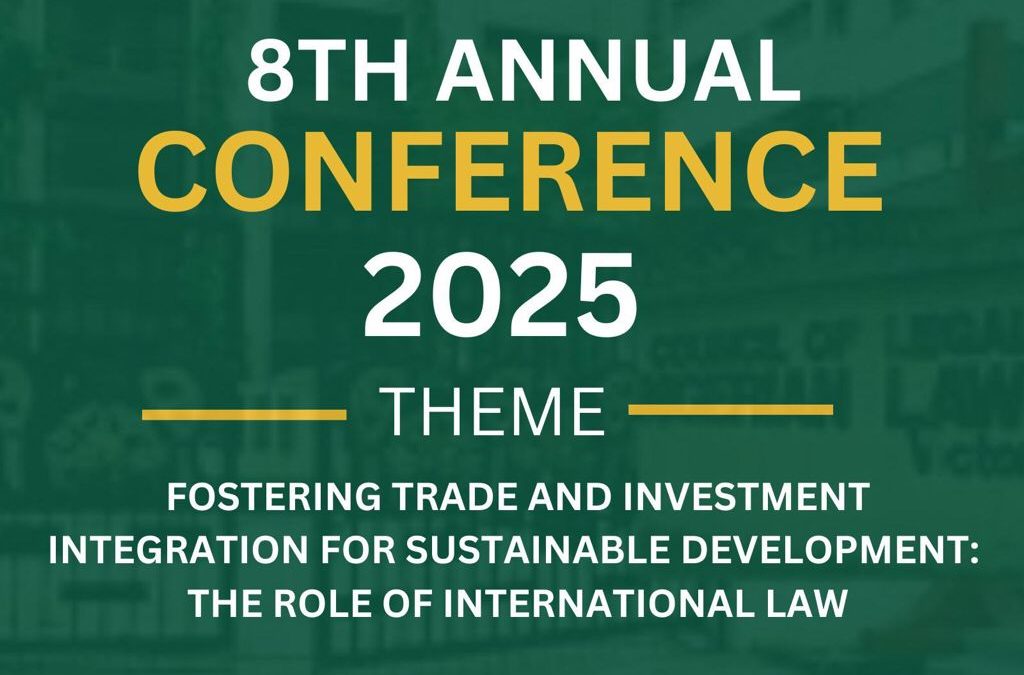
by Legalnaija | Jan 5, 2025 | Uncategorized
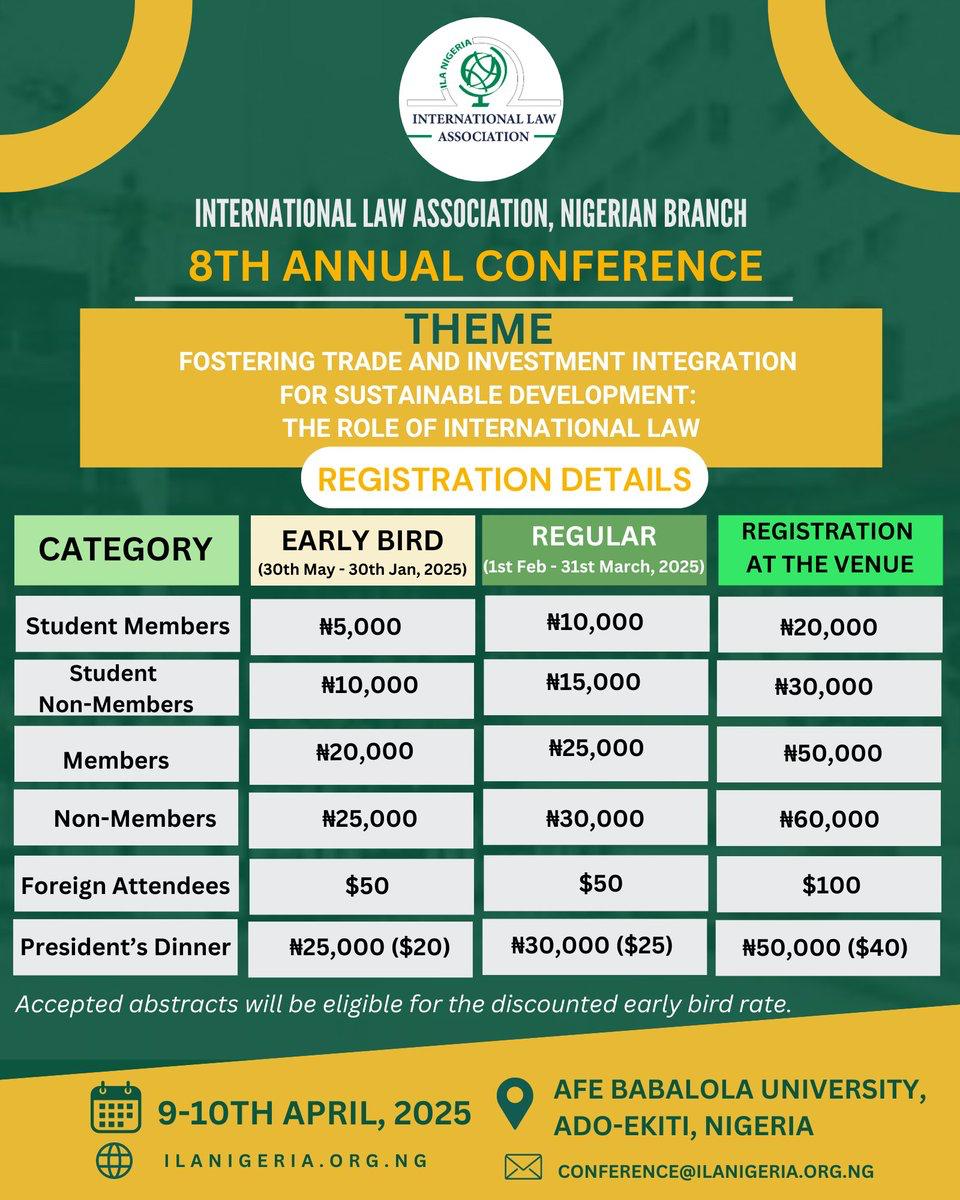
International Law Association (ILA) kicks off registration for its 8th Annual Conference: Early bird registration ends on January 30
To examine the role of international law in boosting regional trade and investment integration as a tool for sustainable development, the Nigerian branch of the International Law Association (ILA Nigeria) will hold its annual conference from April 09-10, 2025.
In a statement by the organizers, this year’s conference, which will hold at Afe Babalola University, Ado Ekiti, will provide a platform for international lawyers to explore the dynamic role of international law in fostering trade and investment that leads to sustainable and inclusive growth. As globalization deepens, the importance of international legal frameworks in guiding and fostering international trade and investment becomes paramount. One of the largest and most anticipated annual legal events, this conference will gather legal scholars, practitioners, policymakers, and business leaders to discuss, debate, and propose forward-looking legal solutions that can contribute to a sustainable global economy.
Confirmed speakers for the conference include H.E Chief Olusegun Obasanjo, GCFR, Former President of the Federal Republic of Nigeria; H.E Omar Alieu Touray, President of the Economic Community of West African States (ECOWAS) Commission, H.E Professor Emmanuel Ibe Kachikwu, Former Minister of State for Petroleum Resources of Nigeria and former President of the Organization of Petroleum Exporting Countries (OPEC); and Professor Damilola Olawuyi, SAN, President of ILA Nigeria and United Nations independent expert on the working group on business and human rights; Mohammed Mijindadi, President and CEO of General Electric (GE) Nigeria and Managing Director of GE Gas Power Systems (GPS) for Nigeria and Anglo-West Africa; Wola Joseph-Condotti, Group Managing Director/CEO, West Power & Gas Limited, amongst other notable experts.
According to the conference registration schedule, early bird discount is expected to end on January 30, 2025.
The ILA was founded in Brussels in 1873. The ILA now has some 4,500 members in 45 national and regional branches around the world. It is headquartered in London under the leadership of the global chair, Professor Christine Chinkin. The Nigerian Branch of the ILA regularly hosts innovative lectures, seminars, conferences, and other capacity development programs to advance the study and understanding of international law in Nigeria. To learn more about the ILA, its activities, and events visit http://www.ilanigeria.org.ng














